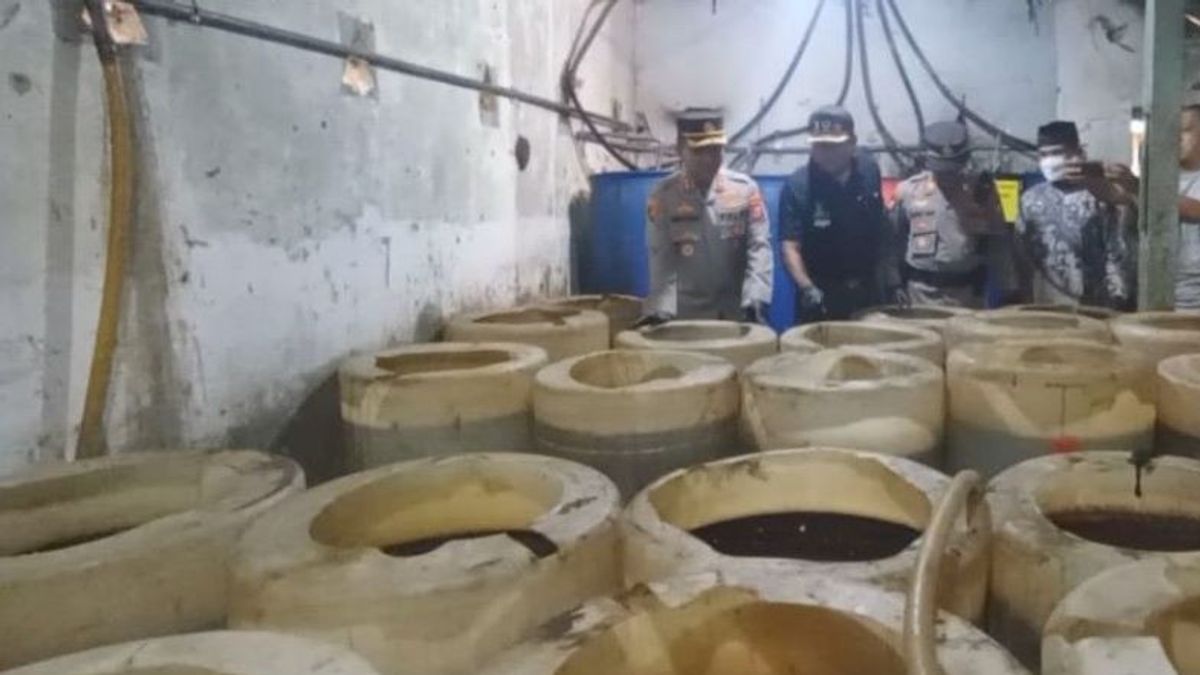MADIUN - Police officers (Polres) Madiun City, East Java, closed a home industry factory that produces alcoholic beverages of the type jowo (arjo) in their jurisdiction with a turnover of tens of millions of rupiah per month.
Madiun City Police Chief AKBP Suryono said the home industry for making arjo was located on Jalan Sidotopo, Sidomulyo Village, Sawahan District, Madiun Regency.
The Arjo factory is a house owned by a local resident who is rented by S (38), a resident of Lamongan Regency. From the home factory, officers managed to secure thousands of liters of arjo ready for distribution.
"S's position is still being investigated and a fugitive. He is the owner of the factory. Apart from S, we have examined four other workers and asked for information," said AKBP Suryono on the sidelines of closing activities at the factory site, quoted by Antara, Friday, May 27.
According to him, S has been renting the house for the past month. The house used to make the Arjo has been empty for about 2 years. The owner also did not know if the house that was being rented out was used as a place for making arjo.
The dismantling of the liquor production was discovered when Madiun City Police officers carried out a patrol on May 24. The patrol is in the framework of the Semeru Community Disease Operation (Pekat) 2022, May 23-June 3.
In addition, the discovery of the existence of the liquor factory was also a development of the findings of the sale of arjo in Kartoharjo and Manguharjo sub-districts, Madiun city and Wungu sub-district, Madiun district some time ago by confiscating dozens of bottles containing arjo.
Meanwhile, the four workers who were questioned, each with the initials SN (39 years old), a resident of Manguharjo, Madiun City, and DRA (18) and SEC (23) are both residents of Wungu, Madiun Regency, and NC (33) is a resident of Sukoharjo, Central Java.
"The employees of SN, DRA, and NC are in charge of the production department, while the SEC alias Kancil is in charge of selling which is assisted by NC," he said.
From the dismantling of the liquor factory, the police secured evidence of 49 jerry cans of jowo arak ready to be distributed, 23 drums of molasses as ingredients for arjo, and 6 sets of equipment for distillation.
The production of arjo, said AKBP Suryono, took place in the last month or so using a mixture of molasses and water as the basic ingredients, then distilled. The perpetrator made arjo on an autodidact basis.
In one production, the new factory produces 4 arjo jerry cans each with a capacity of 30 liters. The Arjo were then circulated in Madiun and Magetan. Each jerry can is sold at a price range of Rp. 350 thousand to Rp. 370 thousand with a profit of Rp. 20 million per month
Sidomulyo Village Head Setiyo Margono said his party did not expect there to be a practice of making liquor in his area.
"Residents in the vicinity are also not suspicious because there is no smell of wine from outside," said Setiyo Margono.
The house is rented for 1 year. To the local village apparatus, the tenant admitted that he would build a hand sanitizer factory and empower local residents as employees.
"Of course we are happy with the plan because it also reduces unemployment. However, we didn't know it had turned into a liquor factory," he said.
For the practice of making liquor, the perpetrators were charged with five articles at once, namely Article 204 paragraph (1) of the Criminal Code, Article 62 in conjunction with Article 8 paragraph (1) letters A and I of Law Number 8 of 1999 concerning Consumer Protection.
Next are Article 140 and Article 142 of Law Number 18 of 2012 concerning Food and Article 106 of UURI Number 7 of 2014 concerning Trade with various threats of imprisonment, ranging from 2 to 15 years.
The English, Chinese, Japanese, Arabic, and French versions are automatically generated by the AI. So there may still be inaccuracies in translating, please always see Indonesian as our main language. (system supported by DigitalSiber.id)













